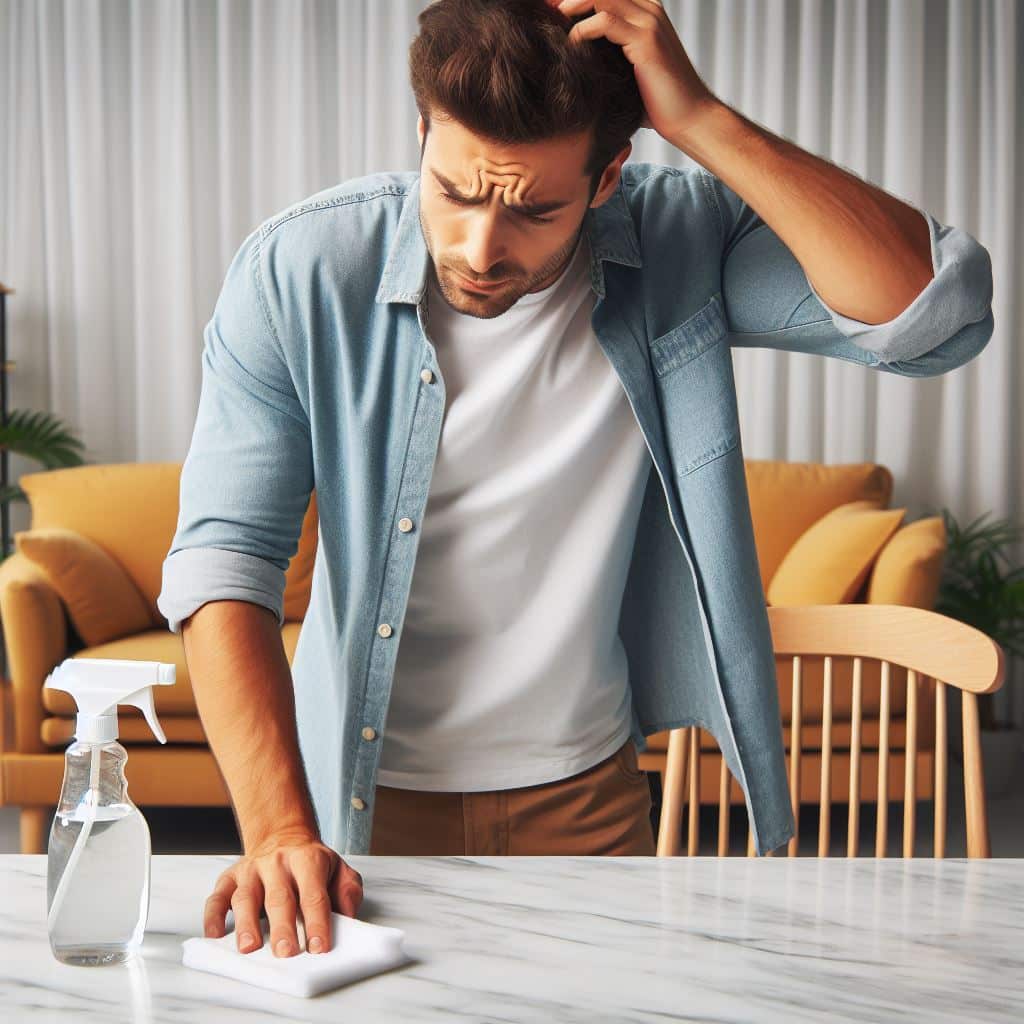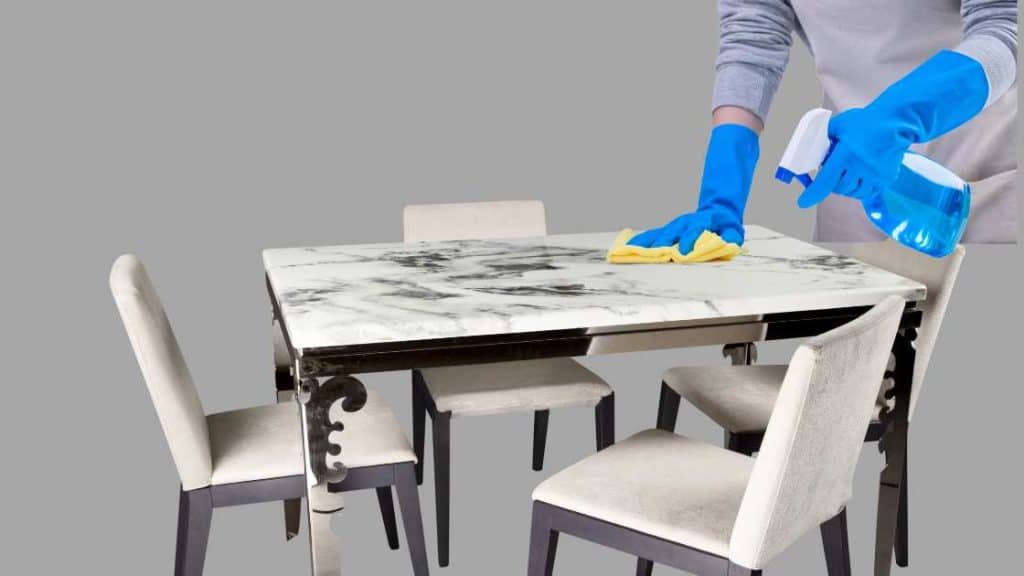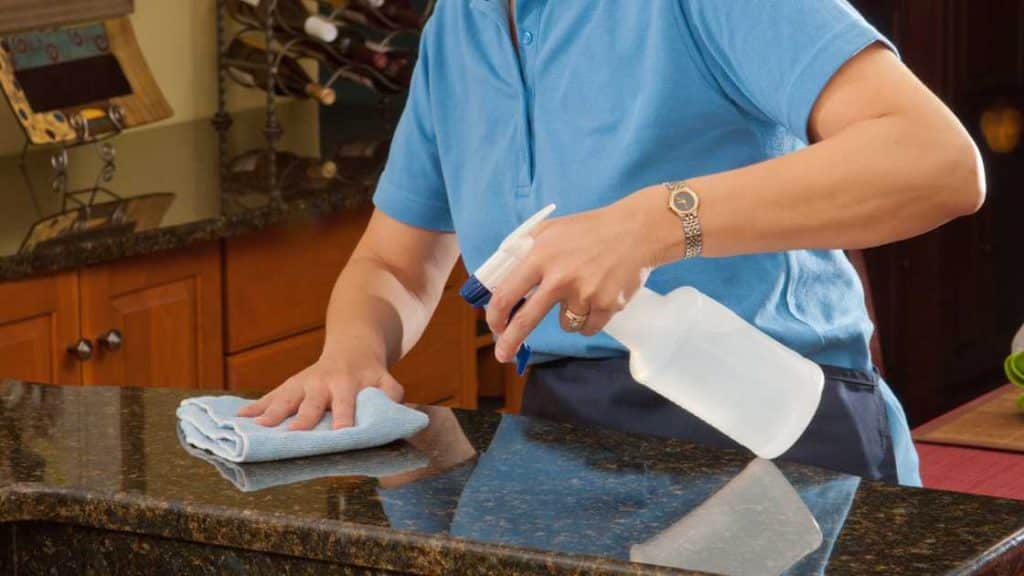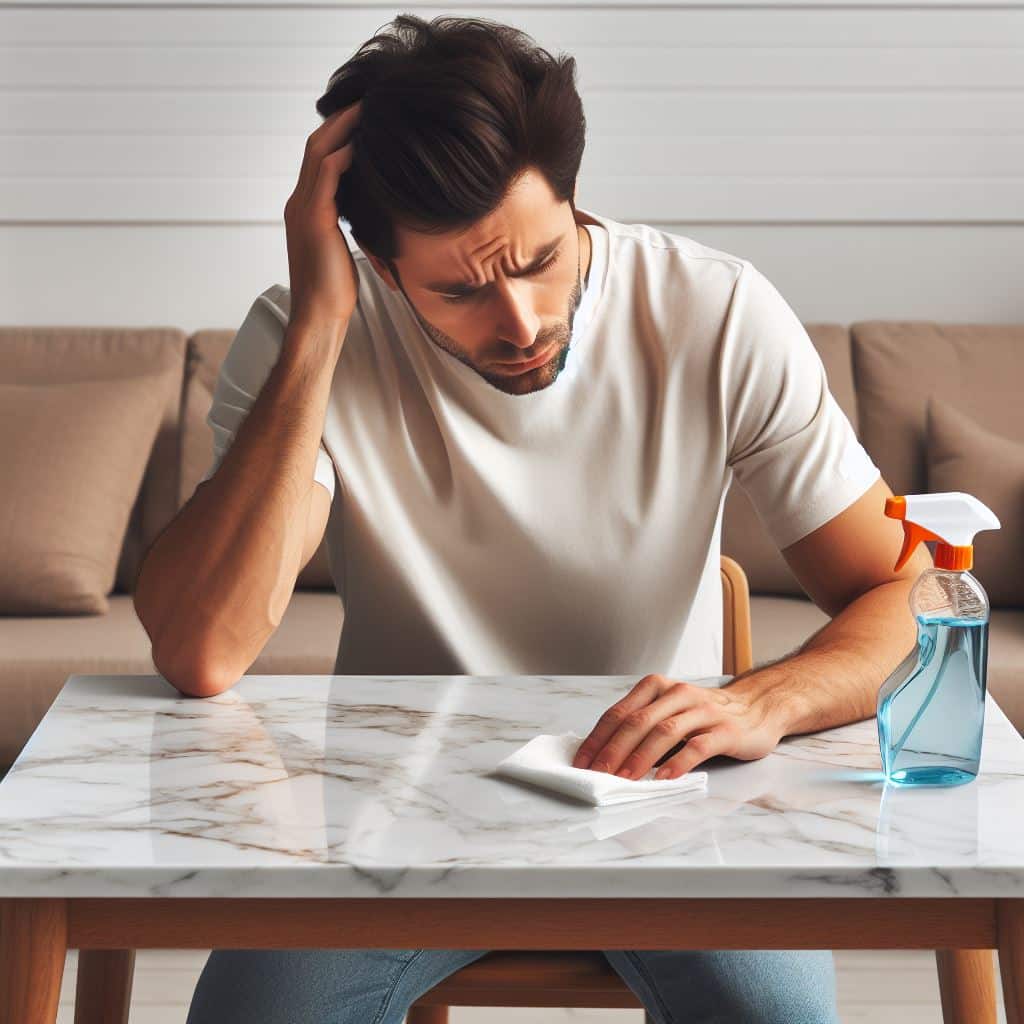To clean a marble dining table, gently wipe the surface with a soft cloth dipped in a solution of mild dish soap and water. Dry the table thoroughly with another clean cloth to prevent water spots.
Maintaining the elegance and durability of your marble dining table is essential for its long-lasting appeal. To ensure its pristine condition, you need to follow a meticulous cleaning routine. How to Clean Dining Table Marble? Given that marble is both porous and delicate, it requires special attention to prevent stains and etching.

By incorporating regular cleaning practices, you can preserve the innate beauty of your marble dining table, transforming it into a captivating focal point in your dining area.
It’s essential to tackle spills immediately and use coasters to prevent ring marks, as marble can react adversely to acidic substances like wine and citrus juices.
For those who cherish their home’s aesthetics, a spotless marble dining table not only reflects well on the household but also invites a positive dining experience.
Regular attention will ensure that your elegant piece retains its luster and remains a centerpiece for years to come.
Introduction To Marble As A Dining Table Material
Welcome to the world of luxury and elegance where marble dining tables reign supreme. Commanding attention with their sleek surfaces and distinctive patterns, these tables transform dining areas into artistic spaces.

Marble’s natural beauty improves meal times, making even the simplest dish feel like haute cuisine. But such grandeur comes with a need for special care.
The Aesthetic Appeal Of Marble
Marble dining tables offer a timeless appeal that transcends trends. The smooth, glossy finish and unique veining of each marble piece ensure no two tables are identical. Their sophisticated appearance elevates the ambiance of any room, making them a centerpiece in the home.
Marble’s array of colors and patterns opens up a world of interior design possibilities, fitting both modern and traditional decors.
The Maintenance Needs Of Marble
While marble adds a touch of sophistication to dining areas, it requires diligent care to maintain its splendor. This natural stone is porous and can easily stain or scratch. Regular cleaning and immediate attention to spills are vital.
Using the right cleaning solutions and techniques preserves the marble’s luster and keeps your dining table looking magnificent for years. It’s important to include maintenance as part of the marble dining table experience.

Common Types Of Marble Used For Dining Tables
Marble dining tables add a timeless elegance to any dining area, with each piece offering a unique pattern and color palette. Many homeowners opt for marble due to its beauty and durability.
The most popular types of marble used include Carrara, Calacatta, and various others, each bringing its distinct characteristics to your dining space.
Differences Between Carrara, Calacatta, And Other Marbles
Carrara marble is famed for its soft grey veining and bright white background. It is more common and generally less pricey.
Calacatta marble stands out with its bolder veining against a pure white background. Other marbles might display a range of colors, from creamy beiges to dark browns, and can vary widely in pattern and price.
Pros And Cons Of Marble Table Varieties
Each type of marble comes with its own set of advantages and caveats. Here’s a quick comparison:
| Marble Type | Pros | Cons |
|---|---|---|
| Carrara |
|
|
| Calacatta |
|
|
| Other Marbles |
|
|
When choosing a marble dining table, consider how much maintenance you are willing to commit to. While marble is sturdy, its porosity demands attention to prevent stains and scratches.
Regular sealing is recommended regardless of the marble type to preserve its natural beauty for years to come.
Before You Start: Pre-cleaning Preparations
Excited to bring back the shine to your dining table marble? Great! Let’s prepare. Proper preparation makes the cleaning process smoother and more effective.

With the right tools and a clear understanding of your marble’s needs, you’ll ensure it remains in pristine condition.
Assembling Your Marble Cleaning Kit
Gather all the essentials before tackling marble stains. Here’s a simple guide to build your marble cleaning kit:
- Soft cloths: For gentle wiping.
- Non-abrasive sponge: To avoid scratches.
- Mild dish soap: Choose a pH-neutral option.
- Sealant (optional): Depending on the marble’s seal status.
- Stone cleaner: Use a product designed for marble.
Identifying Type Of Stains And Marble Sealing Status
Different stains need different care. Recognize what you’re dealing with:
| Stain Type | Characteristic |
|---|---|
| Oil-based | Greasy and darkens marble |
| Organic | Caused by food, leaves a color |
| Inorganic | Metal, rust, hard to remove |
Check your marble’s sealing status. Unsealed surfaces are more vulnerable. Use a water droplet test. Drop water onto the surface and watch. If it beads, your seal is strong. If it soaks in, consider resealing post-cleaning.
Routine Cleaning Practices For Marble Tables

Marble dining tables bring an aura of elegance to any dining room. Maintaining the pristine condition of the marble requires regular and careful cleaning practices. Proper care ensures that this natural stone withstands daily use and looks impeccable over time.
Let’s drop into the recommended ways to keep your marble table spotless and stunning with routine cleaning practices.
Daily And Weekly Marble Cleaning Techniques
Maintaining your marble table’s luster calls for consistent cleaning routines. Use these techniques to protect your marble’s natural beauty:
- Daily: Wipe the surface with a soft, damp cloth to remove dust and crumbs.
- Weekly: Use a microfiber towel and mild soap solution for a deeper clean.
- Avoid leaving spills overnight. Blot fresh spills gently with a paper towel.
- Steer clear of abrasive materials that can scratch the marble.
- Always dry the table thoroughly to prevent water spots.
Best Cleaning Agents For Regular Maintenance
Choosing the right cleaning agents is vital for marble care.
| Cleaning Agent | Use Instructions |
|---|---|
| Mild Soap Solution | Perfect for weekly cleaning, mix with warm water. |
| Special Marble Cleaner | Use for thorough monthly cleaning. |
| Baking Soda Paste | Apply on stains, cover with plastic, leave overnight, and wipe clean. |
Stay away from vinegar, lemon juice, or other acidic cleaners, as marble can easily etch. Follow with a designated marble polish to improve shine.
Dealing With Spills And Immediate Care
Marble dining tables bring elegance to mealtime, but they demand quick action when spills occur. Immediate care is crucial to prevent stains and etching. Learn the right steps to maintain the beauty of your marble table.
Step-by-step Guide: Addressing Spills
- Blot the spill quickly with a soft cloth. Avoid wiping, which can spread the liquid.
- Clean the area with a slightly damp cloth dipped in gentle, pH-neutral soap.
- Rinse with a clean, damp cloth to remove soap residue.
- Dry the spot completely with another soft cloth.
Do’s And Don’ts When Accidents Occur
| Do’s | Don’ts |
|---|---|
| Act fast to clean spills | Use vinegar or lemon juice |
| Use coasters and placemats | Scrub with abrasive cleaners |
| Seal marble regularly | Apply heat directly to the marble |
Deep Cleaning Process For Stubborn Stains
Marble dining tables bring elegance to meals, but tough stains can hide this beauty. Don’t worry. A special clean can make them shine again.
Let’s tackle those stubborn marks and bring back the sparkle to your marble dining table with a deep cleaning process.
Selecting A Stone Poultice For Deep Stains
To remove stubborn stains, a stone poultice is a must. This mixture draws out the stain from the marble. Here’s how to choose one:
- Check the poultice type – Some work only for oil-based stains; others tackle organic or inorganic marks.
- Read the instructions – Safety first! Know how to use the product.
- Consider marble safety – Ensure the poultice is safe for marble.
The Application Protocol For Stubborn Stain Removal
For a deep clean, follow these steps to apply the poultice correctly:
- Prepare the area – Clean the surface gently with water.
- Mix the poultice – Create a paste as directed on the label.
- Apply the paste – Spread firmly over the stain, leaving a thick layer.
- Cover with plastic – Use plastic wrap to cover the poultice.
- Wait patiently – Let it sit for 24-48 hours; stains take time to lift.
- Remove and clean – Take off the plastic, lift the poultice, and wash gently.
- Dry the marble – Use a soft cloth to dry for a spotless finish.
Polishing Marble To Restore Shine
Over time, marble can lose its luster, but polishing it brings back its glossy finish. Shiny marble makes your dining table the highlight of the room. Learn how to choose the ideal marble polish and the steps to achieve that high gloss shine.
Choosing The Right Marble Polish
Not all marble polishes are the same. The right one leaves your table gleaming without damage. Look for a polish labeled as ‘safe for marble’.
Avoid products with acidic substances like vinegar or lemon. These etch the marble. Instead, opt for a pH-neutral polish. It maintains the integrity of your marble while restoring its shine.
Procedure For Polishing Marble To High Gloss
- Clean the Surface: Wipe your table with a soft, damp cloth. Remove all debris and spills.
- Dry Marble Thoroughly: No water should remain. Use a microfiber towel for best results.
- Apply Marble Polish: Apply the chosen polish as per instructions.
- Buff the Marble: Use a soft cloth. Move in circular motions for a sleek finish.
- Extra Buffing: For even more shine, use a chamois. Buff gently until the desired gloss is reached.
- Inspect Shine: Look at the table from different angles. Ensure the gloss is even across the surface.
- Clean Up: Wipe away any remaining polish with a clean, dry cloth.
Regular polish keeps marble radiant. Make this a part of your routine cleaning. This way, your dining table will always be ready to impress your guests.
Protecting Your Marble Dining Table
A marble dining table is a stunning addition to any dining room, making it essential to maintain its elegance. The proper care for your marble is vital for keeping it scratch and stain-free. Let’s discover how to safeguard this sophisticated surface.
The Importance Of Sealing Marble
Marble is porous and vulnerable to stains. The sealant acts as a barrier against spills. Sealing your marble dining table ensures longevity and beauty. It reduces the risk of permanent damage. Regular sealing is a must. Doing so every six months to a year is a good practice.
Instructions For Applying Sealant Effectively
Follow these steps for successful sealant application:
- Choose a sealant suitable for marble.
- Clean the surface thoroughly. Use a gentle cleanser and avoid abrasive materials.
- Make sure the marble is completely dry. Any moisture can affect the sealant’s efficiency.
- Apply the sealant in sections. Use a soft cloth or brush for even coverage.
- Allow it to penetrate the marble. Wait for the recommended time on the sealant’s instructions.
- Remove excess sealant. Use a clean cloth to wipe away any remaining product.
- Let the table dry. Avoid using the table for the drying time suggested by the product.
Regular maintenance, including effective sealing, will keep your marble dining table in pristine condition. Include these care practices to enjoy your beautiful furniture for years to come.
Practical Tips And Marble Care Hacks
Marble dining tables bring elegance to mealtimes, transforming daily gatherings into luxurious affairs. They require special care to maintain their luster and integrity. Discover simple yet effective ways to keep your marble shining with these practical tips and care hacks.
Diy Marble Cleaning Solutions
To maintain your marble’s splendor, consider these DIY solutions. They’re gentle, affordable, and easy to make.
- Baking Soda Paste: A gentle cleaner for light stains.
- Water and Mild Soap: Perfect for regular cleaning.
- Hydrogen Peroxide: Use sparingly for tough stains on light-colored marble.
Apply them with a soft cloth, rub gently, and rinse with water. Always dry the marble immediately to prevent water spots.
Preventing Damage And Adding Longevity To Your Table
Safeguard your marble table effortlessly with these strategies:
| Preventive Action | Benefit |
|---|---|
| Use coasters | Prevents rings and stains |
| Apply sealant annually | Shields against etching and stains |
| Immediate spill cleanup | Avoids persistent stains |
Protect your marble from acidic substances and scratching objects. These extra steps can ensure its beauty endures for years.
Troubleshooting Common Marble Problems
Troubleshooting Common Marble Problems often stand between you and a stunning dining table. A few tips can help address those tough spots.

Addressing Etches And Scratches
Marble’s grandeur can be tainted by etches and scratches. But don’t worry; they’re not forever! Minor scratches might buff out with a soft cloth. For deeper ones, a marble polishing powder does wonders. Just remember:
- Test the powder in a small, inconspicuous area first.
- Follow the product’s instructions carefully.
- Use gentle, circular motions to avoid more damage.
Professional help works best for severe cases.
Alleviating Cloudiness And How To Avoid It
Cloudiness on marble stems from spills and acidic cleaners. Restore its shine by:
- Gently clean with a soft, damp cloth.
- Drying immediately with a microfiber towel.
- Applying marble polish for persistent haze.
Prevent future cloudiness:
| Care Tip | Impact on Marble |
|---|---|
| Use Coasters | Minimizes direct contact with glasses. |
| Clean Spills Promptly | Avoids prolonged exposure to acids. |
| Avoid Acidic Cleaners | Prevents etching and loss of shine. |
Regular maintenance keeps the surface dazzling for years.
Sustaining The Beauty Of Marble Dining Table
The inherent beauty of a marble dining table can captivate any room, but its charm requires a commitment to maintenance. A well-looked-after marble table can be the centerpiece of a dining room for years. The conclusion of this guide is simple: proper care ensures lasting beauty.
Summarizing Marble Table Care Essentials
- Always blot spills immediately to prevent stains.
- Use coasters and placemats to protect the surface.
- Avoid acidic cleaners; instead, select pH-neutral solutions.
- Polish regularly to maintain shine and prevent etching.
- Consider professional sealing for extra protection.
Encouraging Routine Care For Enduring Elegance
Establishing a regular cleaning schedule is key to the long-term beauty of your marble dining table. Weekly dusting prevents surface scratches, while monthly polishing keeps the marble glossy and reflective. Immediate attention to spills and gentle cleaning practices preserve the integrity of the marble. Through these simple habits, your dining table will remain an elegant fixture in your home.
Frequently Asked Questions Of How To Clean Dining Table Marble
What’s The Best Cleaner For Marble Tables?
The safest cleaner for marble tables is a mild, pH-neutral liquid detergent mixed with water. Avoid acidic substances like vinegar or lemon juice, as they can etch the marble. Opt for a specialized marble cleaner for best results. Apply with a soft cloth and wipe gently.
How Often Should You Polish Marble Dining Tables?
Marble dining tables should be polished every one to three months. Regular polishing maintains the shine and protects the surface. Use a commercially available marble polish, following the product instructions precisely. This schedule can vary based on usage and exposure to staining substances.
Can You Use Vinegar On Marble Table Tops?
No, do not use vinegar on marble table tops. Vinegar’s acidic nature can damage marble by causing etching. For cleaning marble, use a pH-neutral solution like warm soapy water or a marble-specific cleaner. Always avoid any acidic or abrasive cleaners to preserve your marble’s integrity.
What’s The Process For Removing Stains From Marble?
To remove stains from marble, create a poultice with baking soda and water to form a paste. Apply the paste over the stain, cover it with plastic wrap, and let it sit for 24 hours. Then, gently remove the poultice, rinse with water, and dry with a soft cloth.
How do I make my marble table white again?
To restore the pristine white appearance of your marble table, try mixing a solution of equal parts water and baking soda to create a gentle paste. Apply the paste to the stained areas, let it sit for a few hours, and then gently scrub with a soft brush or cloth to lift the stains and reveal the table’s original white beauty.
How do I keep my marble table shiny?
To maintain the shine of your marble table, regularly clean it with a mild, pH-balanced cleaner and a soft cloth to remove dust and spills. Apply a marble-specific sealer every few months to protect the surface and improve its luster.
Conclusion
Keeping your dining table marble sparkling is simpler than you might think. Regular maintenance with gentle cleaning solutions and soft cloths can go a long way. Remember, quick attention to spills prevents stains. Include these tips for a timeless shine that impresses guests and elevates home dining experiences.

